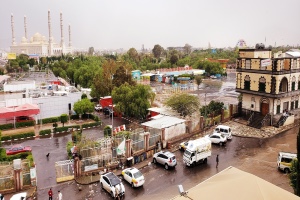
File photo of Yemen’s capital Sana’a
India, Singapore, and UAE-based Aurum Ship Management FZC (Aurum) generated millions of dollars in profit while managing ships connected to al-Jamal and Mahamud, says the US Department of the Treasury
Washington DC: The U.S. Department of the Treasury’s Office of Foreign Assets Control (OFAC) designated members of an international network funding the Houthis’ war against the Yemeni government and increasingly aggressive attacks threatening civilians and civilian infrastructure in neighbouring states, on February 23, 2022 (local time).
OFAC also designated India, Singapore, and UAE based Aurum Ship Management FZC and Aurum’s managing director, Chiranjeev Kumar Singh, as well as a shell company, Peridot Shipping and Trading LLC. It claimed that following the Triple Success’ identification, Singh and Aurum worked with Mahamud to provide critical support to the vessel.“Chiranjeev Kumar Singh is being designated pursuant to E.O. 13224, as amended, for having acted for or on behalf of, directly or indirectly, Aurum Ship Management FZC. Peridot Shipping and Trading LLC is being designated pursuant to E.O. 13224, as amended, for being owned, controlled, or directed by, directly or indirectly, Chiranjeev Kumar Singh,” it said.
The Department of the Treasury stated that Aurum Ship Management FZC (Aurum) generated millions of dollars in profit while managing ships connected to al-Jamal and Mahamud, including the St. Kitts and Nevis-flagged Light Moon, formerly known as the Three, and the Triple Success, which Treasury previously identified as a vessel in which al-Jamal had an interest. “Employees of Aurum have bribed flagging authorities to ignore sanctions-evasion activities by ships in the al-Jamal network. Aurum has also managed ships transferring oil to Houthi-controlled ports in Yemen,” The US Department of the Treasury claimed.
Aurum Ship Management FZC has now been designated for having materially assisted, sponsored, or provided financial, material, or technological support for, or goods or services to or in support of, Abdi Nasir Ali Mahamud.
The al-Jamal- and Mahamud-owned Light Moon, which had been used to illicitly ship petroleum products, had sought to disguise its activities by turning off its Automatic Identification System (AIS), an internationally accepted maritime safety system while conducting operations. The Light Moon was identified as property in which Abdi Nasir Ali Mahamud had an interest.
The United States coordinated this action closely with its Gulf partners, the US Secretary of State Antony J. Blinken said. He said Houthi leaders must cease their campaign of violence and negotiate in good faith without preconditions to end the conflict.
The US Department of the Treasury stated that operating under the leadership of the Islamic Revolutionary Guard Corps-Qods Force and Houthi financier Sa’id al-Jamal, this network had transferred tens of millions of dollars to Yemen in support of the Houthis, “via a complex international network of intermediaries in support of the Houthis’ attacks.
“Despite persistent calls for peace from the international community, the Houthis continue their destructive campaign inside Yemen, and have repeatedly launched ballistic missiles and unmanned aerial vehicles that have struck civilian infrastructure in neighbouring states, resulting in civilian casualties. Today’s action is taken in close coordination and collaboration with regional Gulf partners,” the Treasury Department stated.
Blinken said Houthi attacks inside Yemen and against Yemen’s neighbours, including recent terrorist attacks explicitly targeting civilian sites in Saudi Arabia and the United Arab Emirates, had caused numerous civilian casualties. “The Houthis’ continued military offensive in Marib is exacerbating Yemen’s humanitarian crisis, putting more than a million vulnerable internally displaced people at grave risk. The Houthis have also detained current and former Yemeni employees of the U.S. Embassy in Sana’a without contact with their families for months,” he said. He asserted that the US continues to work closely with its regional partners “to act decisively against those seeking to prolong this war for their own goals. The United States remains firmly committed to helping Saudi Arabia and the UAE defend themselves and the tens of thousands of U.S. citizens living in the Gulf against these Houthi attacks.
Under Secretary of the Treasury for Terrorism and Financial Intelligence Brian E. Nelson said that despite pleas to negotiate an end to the devastating conflict in Yemen, Houthi leaders continue to launch missile and unmanned aerial vehicle attacks against Yemen’s neighbours, killing innocent civilians, while millions of Yemeni civilians remain displaced and hungry. “The United States continues to work with our regional allies to act decisively against those who would seek to prolong this war for their own ambitions. Houthi leaders must cease their campaign of violence and negotiate in good faith to end the conflict,” he added.
According to the Department of the Treasury, the action is being taken pursuant to the counterterrorism authority Executive Order (E.O.) 13224, as amended. The IRGC-QF was designated pursuant to E.O. 13224 in 2007 for supporting Lebanese Hizballah, Palestinian Islamic Jihad, and other terrorist groups.
On June 10, 2021, OFAC had designated al-Jamal and members of his network for their role in generating revenue through the sale of commodities such as petroleum to fund the Houthis. Al-Jamal directs a web of front companies and vessels that smuggle fuel, petroleum products, and other commodities to customers throughout the Middle East, Africa, and Asia. Al-Jamal is aided by Turkey-based Abdi Nasir Ali Mahamud and his network of businesses, which have served as a cover for al-Jamal’s activities.
Sa’id al-Jamal’s International Trade Network
The Department of the Treasury said Al-Jamal’s network generated tens of millions of dollars in revenue with the aid of a diverse array of international commodity traders, including Mahamud, UAE- and Sweden-based Abdo Abdullah Dael Ahmed (Dael), and UAE-based Greek businessman Konstantinos Stavridis (Stavridis).
Dael helped al-Jamal and Mahamud launder and transfer millions of dollars in support of their network. The Dael-operated, Yemen-based Moaz Abdalla Dael Import and Export (Dael Import and Export) transferred over $10 million to al-Jamal. Dael Import and Export worked with Mahamud and his company, the Treasury-designated Adoon General Trading FZE, to import goods into Yemen, allowing al-Jamal to move funds into Yemen in support of the Houthis.
Stavridis used his company Fani Oil Trading FZE (Fani Oil) to purchase gasoline from al-Jamal, the proceeds from which were ultimately sent to the Houthis. Mahamud’s Adoon General Trading FZE helped facilitate the deal. Fani Oil created “fraudulent shipping documents” to facilitate the sale and shipment of gasoline worth tens of millions of dollars.
“Abdo Abdullah Dael Ahmed, Moaz Abdalla Dael Import and Export, and Konstantinos Stavridis are all being designated pursuant to E.O. 13224, as amended, for having materially assisted, sponsored, or provided financial, material, or technological support for, or goods or services to or in support of, Sa’id al-Jamal. Fani Oil Trading FZE is being designated pursuant to E.O. 13224, as amended, for being owned, controlled, or directed by, directly or indirectly, Konstantinos Stavridis,” the US stated.
Treasury also took action on February 23, 2022, against Turkey-based JJO General Trading Gida Sanayi Ve Ticaret Anonim Sirketi and UAE-based Al Foulk General Trading Co. L.L.C, companies directed by Mahamud and Dael, respectively. JJO General Trading Gida Sanayi Ve Ticaret Anonim Sirketi was designated for being owned, controlled, or directed by, directly or indirectly, Abdi Nasir Ali Mahamud. Al Foulk General Trading Co. L.L.C was designated for being owned, controlled, or directed by, directly or indirectly, Abdo Abdullah Dael Ahmed.
Exchange Houses Funding the Houthis
The US Department of the Treasury further stated that proceeds from al-Jamal’s operations were funnelled through a complex international network of intermediaries and money exchange houses. Turkey-based Garanti Ihracat Ithalat Kuyumculuk Dis Ticaret Limited Sirketi (Garanti Ihracat) facilitated millions of dollars worth of transactions for al-Jamal, including transfers in support of oil shipments to China and Syria. Syrian regime-affiliated, Treasury-designated businessman Muhammad Bara’ Qatirji used Garanti Ihracat to send millions of dollars to al-Jamal for oil shipments.
In addition to Garanti Ihracat, al-Jamal had been aided by Yemen-based money exchange houses AlAlamiyah Express Company for Exchange and Remittance and Al-Hadha Exchange Co., both of which have moved tens of millions of dollars in support of al-Jamal’s efforts to fund the Houthis.
Garanti Ihracat Ithalat Kuyumculuk Dis Ticaret Limited Sirketi, AlAlamiyah Express Company for Exchange and Remittance, and Al-Hadha Exchange Co. were all designated for having materially assisted, sponsored, or provided financial, material, or technological support for, or goods or services to or in support of, Sa’id al-Jamal.
Sanctions Implications
All property and interests in property, subject to U.S. jurisdiction of the persons designated, are blocked, and U.S. persons are generally prohibited from engaging in transactions with the designated persons or their blocked property. In addition, any entities that are owned, directly or indirectly, 50 per cent or more by one or more blocked persons are also blocked. Unless authorized by a general or specific license issued by OFAC, or otherwise exempt or authorized, OFAC’s regulations generally prohibit all transactions by U.S. persons or within (or transiting) the United States that involve any property or interests in property of designated or otherwise blocked persons. In addition, foreign financial institutions that knowingly facilitate significant transactions for, or persons that provide material or certain other support to, the persons designated today risk exposure to sanctions that could sever their access to the U.S. financial system or block their property or interests in property under U.S. jurisdiction.
The power and integrity of OFAC sanctions derive not only from its ability to designate and add persons to the Specially Designated Nationals (SDN) List but also from its willingness to remove persons from the SDN List consistent with the law. “The ultimate goal of sanctions is not to punish, but to bring about a positive change in behaviour, the Department of the Treasury explained.
– global bihari bureau





